Lawsuits dispute whether the Indian Child Welfare Act is in the best interests of children

Photo by Shutterstock
Alexandria P.’s short life has been full of harsh goodbyes. At 17 months, she was taken from her parents after accusations of neglect. Los Angeles County authorities placed her in a foster home—but within months, she suffered a black eye and a scrape and was removed again.
A second foster family gave her up after just a few months, partly because of her extreme neediness. By the time she was placed with her third set of foster parents, Rusty and Summer Page, 2-year-old Alexandria called every adult—even those who were not her foster parents—“Mommy” or “Daddy.” The Pages say she was weepy and clingy, but also volatile.
“If you picked her up, she would freak out,” says Rusty Page, a director at a medical technology company. “If you just sat here like this, she would come and sit on your lap. But the minute you stood up with her, she would freak out, like digging her nails in your arm.”
After most of a year with the Pages at their home in Santa Clarita, California, those behaviors almost vanished. Lexi, as she’s now called, came to regard the Pages and their biological children as family—and vice versa. When her birth father gave up on regaining custody in 2012 (a court had already ruled out custody for her birth mother), the Pages decided to pursue adoption.
They knew it would be an uphill battle. Lexi’s birth father is a member of the Choctaw Nation of Oklahoma, which makes her case subject to the federal Indian Child Welfare Act. ICWA lays out special rules for custody and adoption cases involving children from federally recognized Indian tribes.
Like California law, the act prioritizes placement of tribe members with family. In Lexi’s case, there was extended family in Utah interested in adoption—and officials from the county and the Choctaw Nation expressed a preference for placement there.
Those preferences led to another harsh goodbye. In March, after a three-year legal fight, the Pages were forced to give up 6-year-old Lexi.
On the day slated for the transfer, the Pages’ calm suburban block at the foot of the Tehachapi Mountains was crowded with family, friends and neighbors holding signs with messages such as “Save Lexi” and “Do the Right Thing.” Because of the crowd, county child welfare authorities rescheduled the hand-over for the next day, March 21.
But the supporters were back. A stone-faced Rusty carried Lexi through the crowd as Summer screamed “Lexi!” and restrained her oldest daughter, Maddie, from running after them. Maddie and her little brother, Caleb, watched from the driveway, crying. Summer clutched her youngest, Zoey. County child welfare officials escorted Rusty and Lexi through the crowd, blocking the cellphones many were holding up to record the scene.
As they drove away, foster uncle Graham Kelly ran alongside the car yelling, “We love you, Lexi!” He then fell into the street crying. The Pages and their supporters gathered in a circle to pray. Rusty broke down while telling TV reporters that Lexi had been named student of the month at her school.
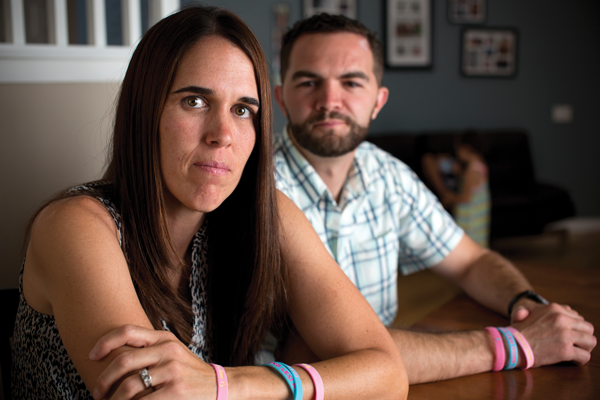
Summer and Rusty Page of Santa Clarita, California, are fighting to regain custody of their foster daughter, Lexi. Photo by Earnie Grafton
Two weeks later, a banner and sign remained outside the Page residence—but the slogans had changed to “#BringLexiHome,” and their attention is now turned toward the courts. The Pages’ appeal is pending, and they say they’ll pursue it to the U.S. Supreme Court, if necessary.
WHOSE BEST INTERESTS?
To make their case known, the Pages have given more than 100 media interviews in which they reiterate their message: The Indian Child Welfare Act, originally intended to protect Native American children from overreaching by child welfare authorities, is now acting against many of those children’s best interests.
“This little girl who’s one sixty-fourth Choctaw is being controlled by her one sixty-fourth,” says Rusty. “If she were a percentage of African-American and the African-American community came and ... dictated where she could go, there would be an uproar.”
That’s the theme of several challenges to ICWA in the last year and a half. Chief among those is Carter v. Washburn, a civil rights lawsuit filed in July 2015 against Kevin Washburn (then the assistant secretary of Indian Affairs) by the Goldwater Institute, a conservative nonprofit whose mission includes limiting government. Drawing on comparisons to Brown v. Board of Education, the complaint argues that the act creates race-based disadvantages for American Indian children, including a proposed class of all off-reservation Native children in Arizona, represented by family law attorney Carol Coghlan Carter as next friend. Those disadvantages could include physically dangerous placements, the complaint says.
“Because of ICWA, what’s happened is that these Indian children are given unequal and substandard treatment, and their interests are not considered primarily in considering the best interests of the child,” says Adi Dynar, a research attorney for the institute.
Those are hotly disputed claims among ICWA practitioners. The legislation was enacted in 1978 because, as congressional research found at the time, “an alarmingly high percentage of Indian families are broken up by the removal, often unwarranted, of their children.” And because many of those children were being raised by non-Indians, tribal cultures were in danger of being wiped out. Tribes still feel those traumas today.
“There is absolutely still an understanding that without ICWA, things would be much worse than they currently are” in terms of children taken from their parents, says law professor Kathryn Fort of Michigan State University’s Indigenous Law and Policy Center. “I think ICWA is absolutely viewed as a tool to protect continued existence.”
Chrissi Nimmo is a Cherokee citizen, assistant attorney general for the tribe in Tahlequah, Oklahoma, and mother of twin toddlers. She says that if “some-thing happened to me, my children are Indian children and they are subject to the Indian Child Welfare Act.” She adds, “I’m glad that there’s a federal law that protects my parental rights, protects my family’s rights and protects my tribe’s rights to my children.”
PAINFUL HISTORY
For many great-grandparents of today’s Indian children, arbitrary removals by nontribal governments were the norm, a practice dating back to the first Indian boarding schools in the late 1800s. The schools were designed by the federal government to assimilate the children into mainstream American society. At the time, memories of U.S.-Indian wars were still fresh, and many Americans considered boarding schools a more progressive option than warfare.
But the policy took a profound toll on families and communities. Students were given new “white” names and punished for speaking their native languages or practicing their religions. Boys had to cut their hair. When they returned home years later, they didn’t know how to be Indians anymore.
Punishment, in keeping with the era, meant beatings, loss of privileges or restricted food. Communicable diseases were common, and underfunding by the government meant some kids went hungry. Without parents nearby, children were vulnerable to physical or sexual abuse. If parents refused to turn their children over, the federal government sent police or withheld the family’s food rations.
Around 1900, tens of thousands of children attended 460 Indian schools across the country, according to a 2006 PBS documentary series, Indian Country Diaries. Boarding schools eventually fell out of favor, in part because of reports of the terrible conditions; a 1975 law permitted tribes to set up their own schools with federal funding. But by the mid-20th century, child welfare workers began removing kids from reservations by claiming neglect—a charge justified by the poverty in which they lived.
By the time the act was under congressional consideration—sponsored by Democratic Sen. James Abourzek of South Dakota, whose state is heavily Native—Indian children were being removed from their homes by child welfare agencies for neglect or abuse in vastly disproportionate numbers to the rest of the population. In 1969 and 1974, the Association on American Indian Affairs found that, in states with high Native populations, 25 to 35 percent of Native children were being removed.
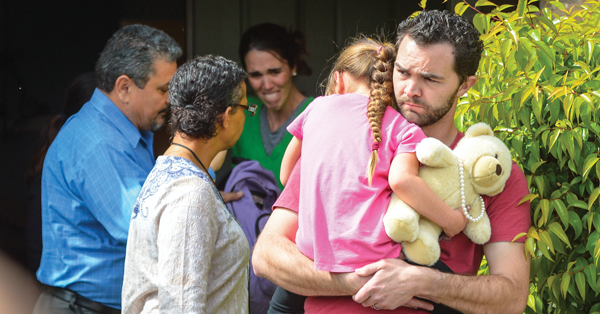
Rusty Page holds Lexi as child welfare officials arrive to take her away in March. Photograph by David Crane/Daily News.
ICWA addresses this on several fronts. To empower tribes, it gives them concurrent jurisdiction over state child welfare cases (and exclusive jurisdiction over ones arising on their own land). Parents may request a transfer to tribal court. In voluntary foster and adoption cases involving Indian children, parental consent must be given in writing. In involuntary cases, the act requires the state to meet a higher legal standard for removal than states typically mandate. And ICWA requires states to show they’ve made “active efforts” to stop the breakup of Indian families; no such requirement exists in state law.
If children are going to foster care or adoption, ICWA requires that courts try to place them first with a relative, then another member of their tribe, then another Indian home and finally, in the case of foster care, a tribally approved institution. Children may be placed outside those preferences only if a court finds good cause to deviate.
That’s the exception the Pages hoped to qualify for—and they thought they had a good case. After almost a year, Lexi had bonded with the family and no longer needed therapy to address her emotional trauma. Staying in Los Angeles County also would keep her near several half-siblings.
Not only that: Summer Page is partly descended from the Southern Band of Tuscarora Indians, which a social worker said could strengthen their case. The Pages had explored that heritage before Lexi was placed with them, and they made an effort to teach Lexi Choctaw language and stories. The Utah family has no Native ancestry, says Rusty Page, and is related to Lexi only through marriage.
But Summer’s tribe is not federally recognized, and thus doesn’t meet ICWA’s definition of an “Indian tribe.” And regardless, both California law and ICWA give non-Indian family a higher priority in placement than unrelated Indians.
In addition, the Utah family was far from strange to Lexi. One of her half-sisters lived with the family for a time and now lives down the street; another, who was born after Lexi, now lives with the family full time. Even before Lexi’s stay with the Pages, the Utah family expressed interest in adopting her, but was told to wait while her father worked toward reunification. After that effort failed, the Utah family began chatting with Lexi twice weekly on Skype. About a year before she was removed from the Pages, Lexi began making overnight visits to the Utah family, including one weeklong visit in the summer.
The parties disagree about Lexi’s reaction to those visits. Rusty says that she was clingy and anxious whenever she left or returned, and that the mother in Utah once called during a visit to have them calm Lexi down. But according to a California Court of Appeal opinion handed down this July, a social worker sent on the weeklong trip says Lexi told her she had a great time and would like to visit again. That appellate opinion says Lexi seemed particularly interested in a relationship with her younger sister who lived with the Utah family.
In late 2013, the Los Angeles County Superior Court ruled that there was no good cause to depart from the placement preferences. The Pages believe they would have gotten custody if not for ICWA. But attorney Leslie Heimov disagrees. She is the executive director of the Children’s Law Center of California, which employs the attorney appointed by the court to represent Lexi. She’s speaking only for the center about this case and says “the law is very clear” in California that placement with family is preferred. “The ICWA piece created a vehicle for all of the appeals,” she says. “But placement with family is always our priority.”
Trial courts have three times ruled for the Utah family; the appeals court has twice ruled that trial courts used the wrong standard and twice remanded it. After the third appeal, in March, it declined to stay Lexi’s removal. That’s how Lexi came to be removed March 21. Her roller skates and helmet were still by the door when she left.
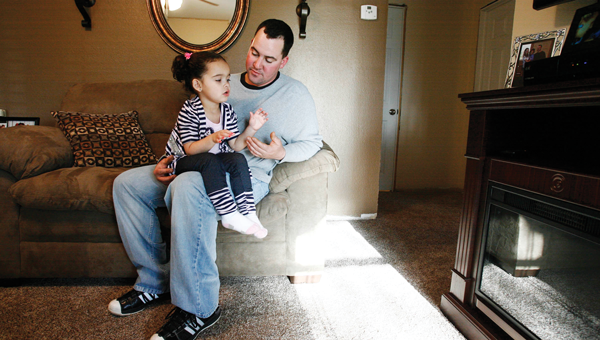
Dusten Brown sits with his biological daughter, Veronica Capobianco, at their home in Nowata, Oklahoma, on April 11, 2013. By September of that year, the Supreme Court would find in favor of her adoptive parents for custody. Photograph by AP Photo/Tulsa World, James Gibbard.
TUG OF WAR
While Lexi’s original case was pending, in September 2013, another family was saying its own harsh goodbye to a little girl.
“Baby Veronica”—who’d just turned 4—had spent the first half of her life with an adoptive couple and the second half with her birth father, Dusten Brown.
On the day she was born, Veronica’s birth mother relinquished her parental rights and placed the infant with the couple—but Brown contested the adoption. Courts in South Carolina, where the adoptive parents lived, awarded custody to her birth father because ICWA’s adoption procedure had not been followed.
The adoptive couple appealed, and Adoptive Couple v. Baby Girl became the second ICWA case to reach the Supreme Court. The justices reversed 5-4. Justice Samuel A. Alito Jr., writing for the majority, said ICWA’s parental rights requirements don’t apply to a parent who never had custody of the child before the case.
Sept. 23, 2013, was a “frantic day,” recalls Nimmo, who had worked closely on the case as an attorney for the Cherokee Nation. Brown would be arrested if he didn’t give Veronica up. Media and protesters were outside his home on tribal land. Inside, the birth family, attorneys and tribal leaders had gathered. After Brown agreed to turn Veronica over, an ambulance came for Veronica’s grandfather, who had a panic attack the family mistook for a heart attack.
Everyone agreed it was best for the two families not to meet face to face, so Nimmo escorted Veronica. She helped the girl pack two suitcases —one with clothes and one with toys—and carried her to a waiting car from the Cherokee Nation Marshal Service, which would take her to the adoptive family at the station.
Nimmo doesn’t think it was traumatic for Veronica. But more than two years later, recalling it still saddens her. “There were tears in her eyes. She wasn’t hysterical,” Nimmo says. “I carried her out and set her in her car seat and helped buckle her in. And I kissed her on the cheek and told her her father loved her.”
“And,” Nimmo says, her voice breaking, “they left.”
The current crop of challenges to ICWA are in some ways attempts to expand Baby Girl. In Carter, the plaintiffs expressly take up the earlier case’s unfinished arguments. Though Baby Girl didn’t reach constitutional issues, the majority said that if ICWA can disrupt an otherwise settled adoption “solely because an ancestor—even a remote one—was an Indian,” that “would raise equal protection concerns.”
Carter puts those concerns front and center. Its complaint argues that ICWA disrupts otherwise fit placements for Indian children and sometimes puts them in danger. Applying it on the basis of Indian status is racial discrimination that violates the children’s equal protection and due process rights under the Fifth and 14th Amendments, the plaintiffs say.
A QUESTION OF RACE
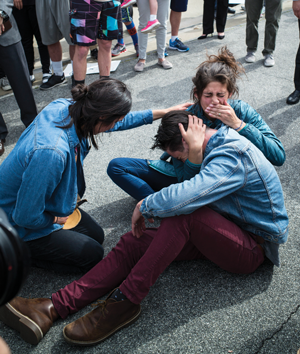
Graham Kelly, Lexi’s foster uncle, fell into the street crying. Photograph by David Crane/Daily News
Underlying that argument is the idea that Indian status is about race. A person’s percentage of Native American ancestry is not relevant under ICWA, but it can matter indirectly. Under federal law, Indians must enroll in their tribes to be officially counted as members. ICWA only applies to children who are enrolled in a federally recognized tribe or are qualified to enroll and have an enrolled parent.
But for tribes to get federal recognition, the law says they must require members to “descend from a historical Indian tribe.” Most tribes require at least a certain percentage of ancestry in the tribe, proof of descent from a member of the tribe or both. Thus, at least a little Indian ancestry is indirectly required to qualify for ICWA.
That dependence on ancestry, the Carter plaintiffs say, makes tribal membership racial. Dynar of the Goldwater Institute notes that child welfare workers are sometimes required to enroll children in tribes. “That sort of involuntary association based on nothing but [lineage] is indeed a racial classification,” he says.
To succeed with that argument, the Goldwater plaintiffs will have to overcome more than 40 years of precedent. In 1974, the high court ruled in Morton v. Mancari that hiring preferences for American Indians at the Bureau of Indian Affairs did not amount to racial discrimination. The unanimous court found that the preference was not racial in nature but depended on political membership in “quasi-sovereign tribal entities.”
Fort says this ruling has been challenged regularly without success. Non-Indians have argued that they should have the “active efforts” rights conferred by ICWA, and Indians have argued that federal laws pertaining to them specifically are racial discrimination. Neither group has succeeded.
“They are trying to overturn all of Indian law” in Carter, Fort says. “It’s terrifying, but also a big weakness.”
The federal government might agree. In a March court filing in Carter, Department of Justice attorneys say ICWA doesn’t rely on race because not all Indian children are eligible for membership in a federally recognized tribe. There are people who don’t qualify by “blood quantum” for enrollment despite being 100 percent descended from tribes, Nimmo says, and anyone is free to leave a tribe. There are also tribes that aren’t federally recognized, like Summer Page’s.
Dynar isn’t convinced. He notes that government, in its motion to dismiss Carter, has said “blood descent is typically shorthand for the social, cultural and communal ties a person has with” a tribe. “Anything that’s shorthand—that just is one step removed from mentioning race by name—is a racial classification.”
That would violate not only the Constitution, but two federal laws enacted specifically to forbid racial discrimination by federally funded adoption or foster agencies: the Multiethnic Placement Act and the Interethnic Placement Act. Those laws say agencies may not refuse or delay placement based on the race of the child or the prospective parents.
Dynar has Supreme Court case law of his own. In 2000’s Rice v. Cayetano, the justices held that “ancestry can be a proxy for race,” and thus the state of Hawaii may not hold elections in which only Native Hawaiians are allowed to vote. The court declined to apply Mancari, in part because that case didn’t implicate state law.
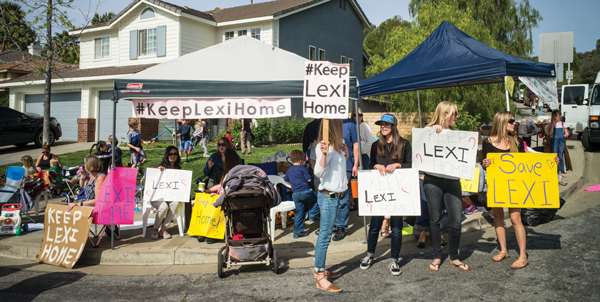
Photograph by David Crane/Daily News
The other national case challenging ICWA also makes the race-based equal protection argument—but it lost its first challenge. In National Council for Adoption v. Jewell, the northern Virginia district court dismissed the case largely on other grounds. But the opinion included a sentence rejecting the discrimination argument, citing Mancari as authority that “the definition [of ‘Indian child’] is political in nature.” An appeal in that case was pending before the 4th Circuit at Richmond.
And race is an issue in a slightly different way in two cases challenging states’ versions of ICWA. In Doe v. Piper in Minnesota and Doe v. Pruitt in Oklahoma, the plaintiffs are Indian parents voluntarily offering babies for adoption. They’re challenging state versions of ICWA requiring notice to the tribe for a voluntary adoption involving an Indian child. They say the laws invade their privacy and discriminate racially in violation of the 14th Amendment. “No other parent in the world has any duty to tell the state about their adoption plan,” says Mark Fiddler, the attorney who represents the Minnesota Does.
Among ICWA attorneys, Fiddler could be considered a turncoat. His credentials are right: He’s a longtime child welfare, adoption and ICWA attorney; the founder of the Indian Child Welfare Act Law Center in Minneapolis; and a member of the Turtle Mountain Band of Chippewa Indians. But he’s also fought against the act—most famously as the former attorney for the white adoptive couple in Baby Girl.

Mark Fiddler. Photograph Courtesy of Minnesota Lawyer
Some in the Native community see that as betrayal. After Baby Girl came down, Fiddler had to learn how to block people on Twitter. It still happens when he’s in the media on ICWA issues. He told Time magazine last March that ICWA reduces stability for Indian kids, a comment that generated more nastiness, he says—some advancing an argument and some just ridiculing him.
“I remember I was in the Minnesota Supreme Court ... trying to stop a case from going to tribal court, and the tribal attorney said, ‘Why don’t you come over from the dark side, Mark?’ ” says Fiddler, a solo attorney in Edina. “It was a joke, but he was clearly telling me I was viewed like I was on the dark side.”
He believes his critics are attempting to shame and scorn him for zealously advocating for his clients. Fiddler has learned to ignore it. “Our first agenda is stopping the harm to the child,” he says.
Fiddler also represents the plaintiff-appellants in National Council. One of the major complaints in that case—echoed in Carter—is about the Interior Department’s 2015 guidelines for interpreting ICWA. If a court is deciding whether to depart from the act’s placement preferences, the guidelines tell it not to consider the best interests of the child. Because the best interests of the child are the primary consideration in all proceedings involving non-Indian children, National Council says, the ICWA guidelines discriminate against Indian children.
The federal government says ICWA’s placement preferences already reflect the best interests of the child; thus, it’s not necessary for judges to consider best interests independently. Nimmo points to amicus briefs filed in Baby Girl and Carter by a group of child welfare organizations. Those said the placement and family reunification requirements are “the gold standard ... that should be afforded to all children.”
But Fiddler says ICWA doesn’t require courts to ignore the best interests of children. He and National Council also argue that the guidelines overstep both ICWA and children’s best interests when they instruct courts not to consider “ordinary bonding or attachment” or the length of a placement as part of a good-cause determination. “It’s one of the fundamental, foundational theories that’s applied in juvenile and family courts—the child’s existing relationship with a caregiver,” he says. “That evidence can’t be presented to the court. It’s just, like, are you kidding?”
FOR LEXI’S SAKE
The Pages might agree. They’re not worried about Lexi’s physical safety with the Utah family, but they believe changing her placement could resurrect her attachment problems.

Summer and Rusty Page stand in foster daughter Lexi’s old room. Photo by Earnie Grafton.
Though she’d gotten better, Rusty says separations were still hard on Lexi. She would cry hysterically when she left to visit her family in Utah, he says, and she was clingy for weeks after she returned.
He says the battle to get Lexi is not a selfish one. “It’s not about expanding our family,” he says, noting that they’d had their third biological child while Lexi was living with them. ”It’s about doing what’s in her best interest.”
The Pages became foster parents not to adopt but because, as Summer puts it, they have “hearts for kiddos.” Before Lexi, they’d had one long-term foster son and several kids in temporary “respite care.” Lexi herself started out as a respite care case, just until she could be placed in a Native American foster home.
But Los Angeles County had no such home at the time, so Lexi stayed. The Pages knew from the beginning that the Utah family was interested in adoption, but the county wanted Lexi to stay local at first so her birth father could work on regaining custody. By the time he gave up, the Pages say, they loved Lexi like their own.
Summer says it’s “dumbing down the situation” to say they were just foster parents. “We didn’t see Lexi like that,” she says. “She was our daughter; why the hell would we not fight for her?”
Heimov, the supervisor of Lexi’s court-appointed attorney, doesn’t believe contesting Lexi’s case has served her best interests. “The delays have been in large part because the Pages keep filing appeals,” she says.
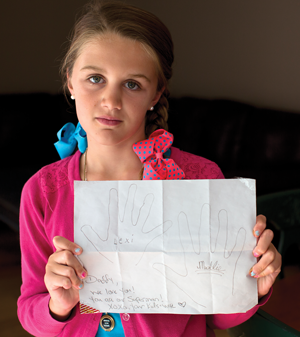
Maddie Page holds a note she and Lexi made for their dad before Lexi was taken away. Photo by Earnie Grafton.
And they intend to keep going. After the Second District Court of Appeal ruled in July that there was no good cause to depart from the placement preferences of the Indian Child Welfare Act, the Pages announced that they intend to appeal to the California Supreme Court.
Nimmo says that adoption decisions should consider the child’s future as well as a relatively short period of her past.
During Baby Girl, she heard from adult adoptees—Indian and non-Indian—who were outraged that Veronica’s father, a fit biological parent, was being denied custody. They grew up without the chance to know their own families, and they felt that loss. “To me, it is going to be in [a child’s] best interest long term to have those types of connections,” Nimmo says.
For Nimmo, news of Lexi’s case dredged up memories of Veronica’s, even though they’re quite different legally. “It’s still so raw when we think back to what happened in the Veronica case,” she says. “My first thought when I saw that was ‘Oh no, here we go again.’ ”
Media coverage of Veronica’s case suggested the Indian Child Welfare Act and her birth father were arbitrarily tearing a family apart. Nimmo worries that the same could happen in Lexi’s case.
But Veronica’s story has a happier postscript: Despite the contentious legal battle, Veronica’s adoptive family has allowed her to stay in touch with her birth family, Nimmo says.
There’s been no indication whether Lexi’s families would be willing to work together. Two weeks after Lexi left, the Pages had heard nothing from her. They were sure she wanted to call, but the Utah family was not allowing contact.
Heimov of the Children’s Law Center of California says the plan was always to maintain contact with the Pages as extended family.
But she says contact was cut off, at least temporarily, because of concerns about creating another media circus like the one that surrounded Lexi’s removal.
“It doesn’t have to be this way,” says Heimov. “There could be a large, loving extended family for this child. Ideally, she would just have a whole lot of people in her life who love her.”
This article originally appeared in the October 2016 issue of the ABA Journal with this headline: “Children of the Tribe: Lawsuits claim the Indian Child Welfare Act is not always in the best interests of those it’s meant to protect.”



